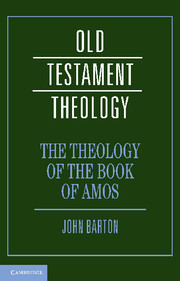Book contents
- Frontmatter
- Contents
- General Editors’ Preface
- Preface
- Abbreviations
- Chapter 1 Amos: The Critical Issues
- Chapter 2 Religious Belief and Practice in Amos’s Day
- Chapter 3 The Theology of Amos and His Circle
- Chapter 4 Theological Themes in the Additions to the Book of Amos
- Chapter 5 The Theology of the Book of Amos
- Chapter 6 The Reception of the Theology of Amos
- Chapter 7 The Theology of Amos Then and Now
- Further Reading
- Author Index
- Scripture and Apocrypha Index
- References
Chapter 5 - The Theology of the Book of Amos
Published online by Cambridge University Press: 05 June 2012
- Frontmatter
- Contents
- General Editors’ Preface
- Preface
- Abbreviations
- Chapter 1 Amos: The Critical Issues
- Chapter 2 Religious Belief and Practice in Amos’s Day
- Chapter 3 The Theology of Amos and His Circle
- Chapter 4 Theological Themes in the Additions to the Book of Amos
- Chapter 5 The Theology of the Book of Amos
- Chapter 6 The Reception of the Theology of Amos
- Chapter 7 The Theology of Amos Then and Now
- Further Reading
- Author Index
- Scripture and Apocrypha Index
- References
Summary
Can there be a theology of the finished book of Amos? Does the book, as opposed to its constituent parts, have any coherence? The underlying supposition of the Old Testament Theology series in which the present book is appearing is obviously that there can be such a theology. But this was not always self-evident to earlier generations of modern critical biblical scholars, who tended to think that coherence could be found only by removing (“deleting”) the later additions that we looked at in the preceding chapter, so as to arrive at the theology of the prophet Amos himself. By now, the reader will have realized that I have some sympathy with that belief. I do think that the attempt to get back to the prophet himself is worthwhile and important. On the other hand, there is a book of Amos, and it contains the additions as well as the original words of the prophet, and in modern times it has become normal to think that it is possible to interpret the finished books of the Bible as well as their original cores. Indeed, some scholars now think that the final form of the book has a greater claim on our attention than do the hypothetical earlier stages.
Three Approaches to the Final Form
We can identify three different though related routes to a “final form” reading of any biblical book, and this is certainly the case for the book of Amos.
- Type
- Chapter
- Information
- The Theology of the Book of Amos , pp. 133 - 160Publisher: Cambridge University PressPrint publication year: 2012



